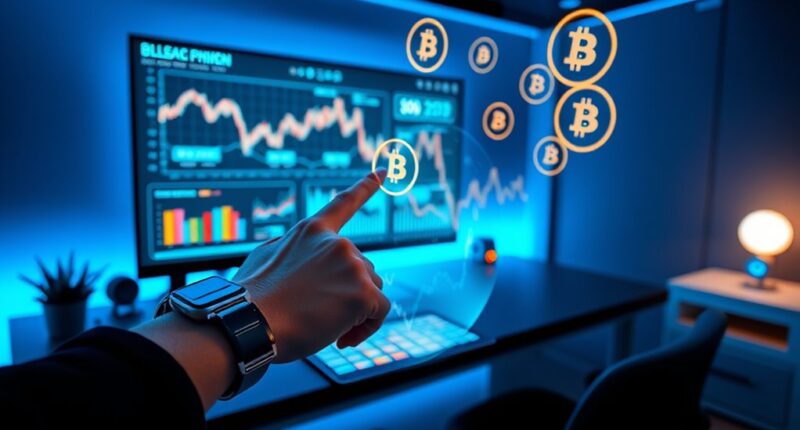By providing liquidity to decentralized data markets, you control how your personal information is shared and monetize it securely. You contribute data to pools, earn tokens or rewards, and maintain privacy through advanced encryption and blockchain tech. This transparent system guarantees fair compensation and fosters a collaborative ecosystem. As you participate, you help create a more trustworthy, innovative data economy. Keep exploring how this new approach can empower you to turn your data into dollars.
Key Takeaways
- Contribute personal data to decentralized pools to enable secure, fair access for buyers and earn rewards.
- Maintain control over your data sharing preferences while monetizing your digital footprints.
- Use blockchain technology to ensure transparent transactions and protect data privacy during trading.
- Provide liquidity by supplying relevant, high-quality data to enhance market value and earning potential.
- Benefit from a collaborative ecosystem that rewards data owners and promotes trust and innovation.

Decentralized data markets are transforming how we buy, sell, and share information by removing the need for centralized authorities. Instead of relying on large corporations or middlemen, you have the power to control your data directly. This shift emphasizes data ownership, meaning you decide who accesses your information and how it’s used. By maintaining control over your data, you can monetize it securely, turning your digital footprint into a source of income. This model not only empowers individuals but also encourages more transparent and fair trading environments.
Privacy preservation plays a vital role in these markets. You no longer have to sacrifice your personal information for monetary gain. Advanced encryption techniques and blockchain technology ensure that your data remains private and secure during transactions. When you provide liquidity to a decentralized data market, you can choose what data to share and under what conditions, preserving your privacy at every step. These platforms often incorporate privacy-preserving protocols, which allow data to be shared or sold without exposing sensitive details. This means you can profit from your data without risking your personal security or violating your privacy.
Providing liquidity in a decentralized data market isn’t just about offering your data; it’s about actively participating in a new economy where data becomes a valuable asset. You can contribute your data to a pool, enabling others to access and purchase it. In return, you earn tokens or other forms of compensation. The more valuable and relevant your data is, the more you can earn. Because these markets operate on transparent blockchain protocols, you always have visibility over how your data is used and who is accessing it. This transparency builds trust and guarantees fair compensation.
Moreover, decentralized data markets foster a collaborative environment. Instead of data hoarding or restrictive policies, you contribute to a shared ecosystem that benefits everyone. By providing liquidity, you help create a more dynamic and efficient marketplace where data can be exchanged securely and fairly. This setup encourages innovation, as new players can access high-quality data without the barriers of traditional proprietary systems. Additionally, understanding signs of spoilage in data, such as outdated or inaccurate information, can help maintain the integrity of these markets.
Frequently Asked Questions
How Secure Are Transactions in Decentralized Data Markets?
You might wonder how secure your transactions are in decentralized data markets. While these markets use smart contracts to automate agreements, vulnerabilities in them can pose risks. However, advanced data anonymization techniques help protect your privacy, reducing exposure. Overall, security depends on proper smart contract auditing and effective anonymization, making these transactions fairly safe if you stay cautious and choose reputable platforms.
What Are the Main Risks for Data Liquidity Providers?
Risks for data liquidity providers are like riding a roller coaster—full of twists and unpredictability. You face market volatility, which can rapidly change data value, and liquidity incentives that might not always cover potential losses. If demand drops suddenly, you could be left holding data that’s hard to sell. Staying informed and diversifying your data sources helps mitigate these risks and keeps your position safer.
How Do Decentralized Data Markets Ensure Data Quality?
Decentralized data markets guarantee data quality through robust data validation processes, where contributors verify and authenticate data before sharing. Additionally, reputation systems track user performance, encouraging high-quality contributions and penalizing poor data. You can rely on these mechanisms to maintain accuracy, fostering trust among participants. By combining data validation with reputation systems, these markets create a reliable environment, ensuring you access trustworthy, high-quality data for your needs.
Can Individuals Monetize Personal Data Securely?
Ever wondered if you can monetize your personal data securely? The answer lies in understanding your data ownership and privacy policies. When you participate in decentralized data markets, you retain control, setting clear terms for data usage. This setup helps protect your privacy while allowing you to profit. By staying informed and choosing platforms that prioritize security, you can confidently turn your data into a valuable asset without risking your privacy.
What Are the Legal Considerations for Participating in These Markets?
When participating in decentralized data markets, you need to understand legal frameworks and guarantee regulatory compliance. You’re responsible for protecting personal data and adhering to privacy laws like GDPR or CCPA. Always verify that data sharing agreements are clear and lawful. Staying informed about evolving regulations helps you avoid legal issues. By doing so, you can confidently monetize data while respecting legal boundaries and maintaining trust.
Conclusion
By providing liquidity to decentralized data markets, you open new earning opportunities and become a pioneer in the digital gold rush. Think of it as riding the wave of the Information Age, where data is the new currency. Don’t get left behind like a forgotten miner in the Klondike, because those who embrace this future now will reap the rewards later. Turn your data into dollars—it’s your move in this brave new world.









